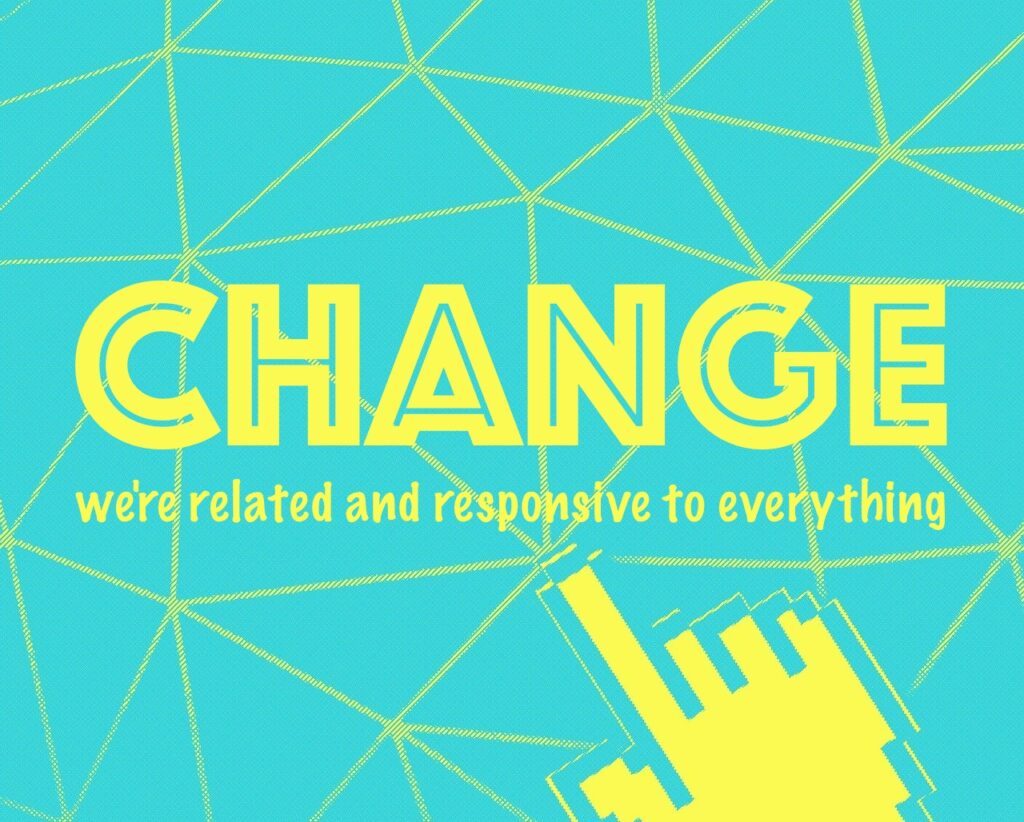Change – shifts within a culture or society that come as a result of a variety of social, economic, environmental, or political events, as well as from shifts in cultural attitudes, norms, and values

When you think of change, what comes to mind? Where does change happen? Where have you changed, personally? What changes have you aimed for in society and your wider world?
Whether personally, socially, or structurally, change is something people have always strived to do and enact in the world around them. Change is how people shift their realities, improve them for themselves and others, and set new ways of being into motion. Change is powerful, promising, and necessary. Anthropologically, change is studied on a social and cultural level, and anthropologists try to fight for change to benefit people, especially the people they work with.
When we orient ourselves towards making change, it means we are interested in the ways our world can be better. It means fighting injustice, structural inequality, and prejudice, and building new ways of relating, and a new society, in its place. Change happens because we make it happen.
||| Explore the Literature |||
Beck, Sam and Maida, Carl A. 2015. Public Anthropology in a Borderless World. New York/Oxford: BerghahnNew York/Oxford: Berghahn.
Summary from publisher: Anthropologists have acted as experts and educators on the nature and ways of life of people worldwide, working to understand the human condition in a broad comparative perspective. As a discipline, anthropology has often advocated — and even defended — the cultural integrity, authenticity, and autonomy of societies across the globe. Public anthropology today carries out the discipline’s original purpose, grounding theories in lived experience and placing empirical knowledge in deeper historical and comparative frameworks. This is a vitally important kind of anthropology that has the goal of improving the modern human condition by actively engaging with people to make changes through research, education, and political action.
de Sardan, Jean-Pierre Olivier. 1995. Anthropology and Development: Understanding Contemporary Social Change. London/New York: Zed Books.
Summary from publisher: This book re-establishes the relevance of mainstream anthropological (and sociological) approaches to development processes and simultaneously recognizes that contemporary development ought to be anthropology’s principal area of study. The introduction provides a thought-provoking examination of the principal new approaches that have emerged in the discipline during the 1990s. Part I then makes clear the complexity of social change and development, and the ways in which socio-anthropology can measure up to the challenge of this complexity. Part II looks more closely at some of the leading variables involved in the development process, including relations of production; the logics of social action; the nature of knowledge; forms of mediation; and “political” strategies.
Eriksen, Annelin. 2007. Understanding Cultural Change: The Return of Core Anthropological Concepts, Reviews in Anthropology, 36:2, 131-154.
Abstract: Core anthropological concepts like culture and society have become vacated categories. The four books reviewed here all represent important efforts to return these concepts to anthropology. Among the key issues discussed here is the importance of such concepts for an understanding of cultural change. What is culture? How does culture change? How is agency related to the process of change?
Harris, Marvin. 1991. America Now: The Anthropology of a Changing Culture. New York, NY: HarperCollin.
Summary from publisher: Written by one of the most famous modern anthropologists, the fifth edition of Cultural Anthropology holistic view of sociocultural continues to focus on the book’s two major objectives. First, it presents a system, and secondly, the book provides a unified theoretical framework for explaining these systems. It also remains faithful to the belief that anthropologists must routinely deal with facts and theories that are crucial to informed decisions regarding issues of enduring relevance. The cultural approach used throughout furnishes a framework for explaining how the parts of sociocultural systems are interrelated and how they change over time. The book also continues in its effort to identify the many causal strands that help explain the process of sociocultural change. It tries to make sense of the many seemingly irrational or arbitrary customs and institutions in small, technologically simple societies as well as complex nations. For anyone interested in the study of culture.
Nuttall, Mark. 2016. Anthropology and Climate Change: From Encounters to Actions. United Kingdom: Taylor & Francis.
Summary from publisher: The first book to comprehensively assess anthropology’s engagement with climate change, this pioneering volume both maps out exciting trajectories for research and issues a call to action. Chapters in part one are systematic research reviews, covering the relationship between culture and climate from prehistoric times to the present; changing anthropological discourse on climate and environment; the diversity of environmental and sociocultural changes currently occurring around the globe; and the unique methodological and epistemological tools anthropologists bring to bear on climate research. Part two includes a series of case studies that highlights leading-edge research—including some unexpected and provocative findings. Part three challenges scholars to be proactive on the front lines of climate change, providing instruction on how to work in with research communities, with innovative forms of communication, in higher education, in policy environments, as individuals, and in other critical arenas. Linking sophisticated knowledge to effective actions, Anthropology and Climate Change is essential for students and scholars in anthropology and environmental studies.